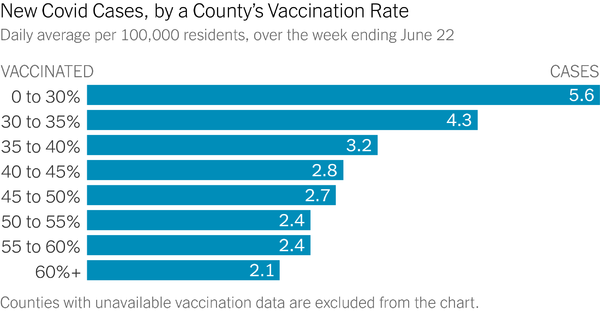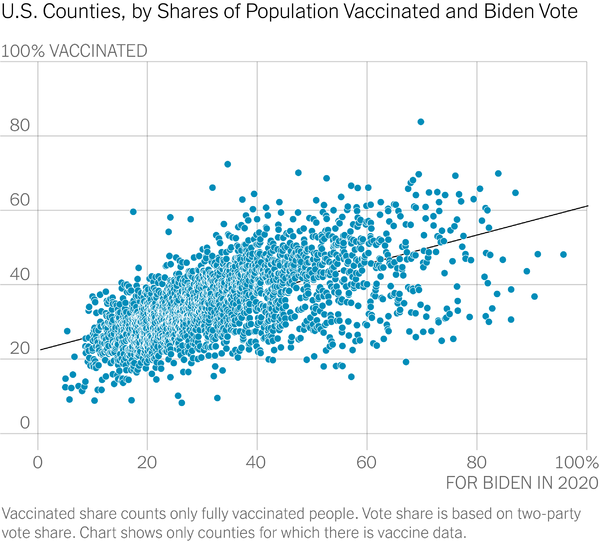The Delta variant of the SARS-CoV-2 virus is now rapidly becoming the dominant strain. This variant is more easily transmissible and more dangerous, and Dhruv Kullar warns that from the evidence gained so far from the UK, it poses a greater risk to the unvaccinated.
Earlier this year, scientists estimated that lineage B.1.1.7-the Alpha variant, first isolated in England-could be some sixty per cent more transmissible than the original version of sars-CoV-2. Now experts believe that the Delta variant is sixty per cent more transmissible than Alpha-making it far more contagious than the virus that tore through the world in 2020. It hasn’t yet been conclusively shown that Delta is more lethal, but early evidence from the U.K. suggests that, compared to Alpha, it doubles the risk of a person’s being hospitalized. Even if the variant turns out to be no deadlier within any one person, its greater transmissibility means that it can inflict far more damage across a population, depending on how many people remain unvaccinated when it strikes.
For awhile, it seemed like in the US there was not much difference in the Covid-19 infection and death rates between those areas which had high vaccination rates and those that had low, leading some vaccine hesitant people to conclude that it was not really necessary and that they could ride out the pandemic. But that picture has now changed and low vaccination areas are seeing higher infection rates now. It is not clear if that was simply a time lag factor or because of the arrival of Delta variant.
In his newsletter (no link, unfortunately), New York Times reporter David Leonhardt lays out the statistics in a couple of charts. The first chart looks at the number of new cases, comparing counties according the share of residents who have been fully vaccinated.
He says, “A month ago, a chart like this would have looked almost random, with little relationship between caseloads and vaccination rates. Now, there is a clear relationship.”
While it is still early days to see what the causal relationship may be, there are some hints.
One likely explanation is that vaccination rates have risen high enough in some communities to crush the spread of Covid. In the spring, these places were still coping with significant outbreaks, but they aren’t anymore.
In Marin County, just over the Golden Gate Bridge from San Francisco, for instance, more than 90 percent of people aged 12 and above have received at least one shot. As a result, Marin has virtually extinguished the virus, with only three new confirmed cases per day in recent weeks.
A second explanation for the new divergence between more and less vaccinated places is the Delta variant. It appears to be making vaccination even more valuable. The vaccines are effective against Delta, sharply reducing the chances of infection and nearly eliminating any chance of serious illness. For unvaccinated people, however, Delta is significantly more contagious than earlier variants.
Missouri offers the clearest example. Over the past week, it has reported more new Covid cases per capita than any other state, and they are concentrated in rural areas that have low vaccination rates, as Charles Gaba, a health care analyst, has noted. In the parts of the state with high vaccination rates – like the metro areas of Kansas City, St. Louis and Columbia – the number of new cases remains very low.
Now see what happens when one organizes the data according to the votes in the 2020 election.
The places with the lowest vaccination rates tend to be heavily Republican. In an average U.S. county that voted for Donald Trump, only 34 percent of people are fully vaccinated, according to New York Times data. In an average country that voted for Joe Biden, the share is 45 percent (and the share that has received at least one shot is higher).
No wonder, then, that the number of new cases keeps falling in Biden counties, while it has begun to rise in Trump counties.
What I find particularly maddening is how a public health problem and solution that should be utterly apolitical has become so polarized by political loyalties in the US. This can be laid squarely at the feet of Trump and his supporters in the right wing media ecosphere who have made this into a partisan issue.
Is that also the case in other countries? I have not done an exhaustive survey but based on my family and friends in Sri Lanka, UK, Australia, and New Zealand, the US is alone in this kind of lunacy. As far as I am aware, in the UK, for example, both Labour and Conservative parties are very pro-vaccination.
Whatever one’s political views, public health should come first. I wish Republicans would get with the vaccination program. They have locked themselves into an untenable position where they may fear losing face if they suddenly switch. I don’t know what it will take for them to change their anti-vaccination stance. Massive sickness, hospitalizations, and deaths among the people they claim to represent? It would be so tragic and so unnecessary.



We have seen a few Conservative premiers do some stupid things in Canada but, other than some really idiotic MPs/MLAs (Hi Randy, Hi Maxime) showing up at a packed church, there does not seem to be any serious political divide on vaccinations.
The MP got arrested at one point 🙂
Mano, please refrain from saying scientifically unsupported statements like, “This variant is more easily transmissible and more dangerous.”
We *do not know* whether this variant is more transmissible or more dangerous (or both), because we have not performed those experiments. The delta variant has more fitness than other variants in many countries, but that could be for a number of reasons, and it does not mean that the virus is more transmissible or that it causes more severe disease.
I strongly agree with this New York Times opinion piece written by Vincent Racaniello and Amy Rosenfeld, two virologists at Columbia: https://www.nytimes.com/2021/06/27/opinion/covid-vaccine-variants.html
Early estimates of transmissibility are complicated by the fact that relevant metrics, such as R0, depend on human behavior. We know that as vaccines start to roll out, people (including those who haven’t finished vaccinating) start to go out and interact, allowing the virus to spread.
Until we know more about this particular variant, I think it would be prudent to edit this blog post to remove potentially misleading or incorrect information.
As an addendum to my above post, I would note that Kullar’s statement that “scientists estimated that lineage B.1.1.7-the Alpha variant, first isolated in England-could be some sixty per cent more transmissible than the original version of sars-CoV-2” turned out to be incorrect. We know that this estimate was wrong. It is irresponsible of Kullar to continue to promote this estimate that we know was wrong.
I’m so worried about autumn, when my probably still unvaccinated children will have to return to school without any protection beyond “please open the windows”. And because overall incidence will be low, no measures will be taken.
If you ever doubted that in Germany we really hate our children, just look at this pandemic. For more than a year we asked so much of our kids. And now that most conservative voters have been vaccinated, we say “go fuck yourselves”. In Germany there isn’t that much dispute over whether to get vaccinated or not, but we prioritised according to “most likely to die”. this means that elderly people who are more likely to vote conservative think that the pandemic is over and everything is ok.
Meanwhile the commission responsible for recommending vaccinations has not recommended routine vaccination in kids above 12, totally dismissing long Covid. In my opinion that’s purely political because they don’t want to admit that they still don’t have enough vaccine to give it to our kids. This will change in autumn when Delta cuts through schools like a hot knife through butter, but by then many children will have caught Covid.
Meanwhile I’m half clandestinely looking for somebody to vaccinate my kids.
One bit of good news: Mixing vaccines turns out to be a good idea. A study shows that getting Pfizer and Astrozenaca (in either order) offers protection, potentially even against the Delta variant. This could be important when there’s a shortage of second doses -- “just give them anything available” may be good enough.
https://www.bbc.com/news/health-57636356
Giliell @#4:
Looking at the news since the beginning of the pandemic, planning ahead for schools and kindergartens in Germany mostly seems to have happened at the teachers & parents level. To the states’ ministries of education, the term “project management” seems to be entirely foreign, or focused on the past, not the future.
“Is that also the case in other countries?”
Neither in Suriname nor in The Netherlands.
In Suriname some maroons and indians distrust vaccinations as a neo-colonial instrument.
In The Netherlands some politicians (no surprise: all right wing extremists) have tried, but largely failed thus far. It still is possible that they have enough adherents that group immunity will remain out of reach, but I don’t expect it. This is because of the cynical mechanism you describe:
“It would be so tragic and so unnecessary.”
Not really. From a negative point of view: we finally reach the situation that being not vaccinated becomes a choice. Suffering and death will be the consequences -- or not. Like I wrote a few days ago, what bothers me is that those anti-vax loons will burden health care that could be used for others.
On the positive side: from a global point of view the shortage of vaccins won’t disappear overnight. Huge areas in Africa and Asia still are largely unprotected. Are there Surinamese, Dutch, American fools who stubbornly refuse vaccins? Good for them. Help people elsewhere on the planet who badly need it and give them those vaccins. See, I don’t think the lives of Surinamese, Dutch and Americans more valuable than say Central-African ones. It only becomes “tragic and unnecessary” after those people have received their vaccins. We are still a long way from that point.
https://ourworldindata.org/covid-vaccinations
For those 99% in low-income countries the more anti-vax loons in Europe and the USA the better.
@5- I read many months ago that Moderna was considering adding the new sequence (maybe Alpha at the time) to the original in the same dose. Amazing that they had their first version prepared within 48 hours of the sequence being published online (early/mid-January, 2020).
Matt G @8, an illustration of how amazingly more useful this type of vaccine can be!
Now, once you know a new virus’ sequence, you just clip out its version of the relevant gene and toss it into the vial. Finis. No muss, no fuss, of trying to learn how to culture the new variant in cells, or eggs, and isolate it and purify it, etc. Very encouraging for future illnesses of all kind.
Whether Delta is more transmissible or not, there is one thing that’s firmly established: though the number of deaths in much of America is now, mercifully, much smaller than before, many hospitals are reporting that 100% of the deaths they’ve had are of unvaccinated people. Yes, in some places every single person that dies of Covid is now unvaxxed.
A compelling argument, one would think.
@Giliell(#4):
That is crazy. Young people might not die from COVID but there is a good chance that they will end up with long term effects, at least if this findings in this article hold up.
RE garnetstar @9, changing sequence: the steps involved in production may be more predictable, but of course you would still have to repeat the various tests and trials. Because changing the sequence changes how it will interact with the inoculated organism. Also, I would think it’s more expensive to custom manufacture modified RNA than it is to express a protein in bacteria.